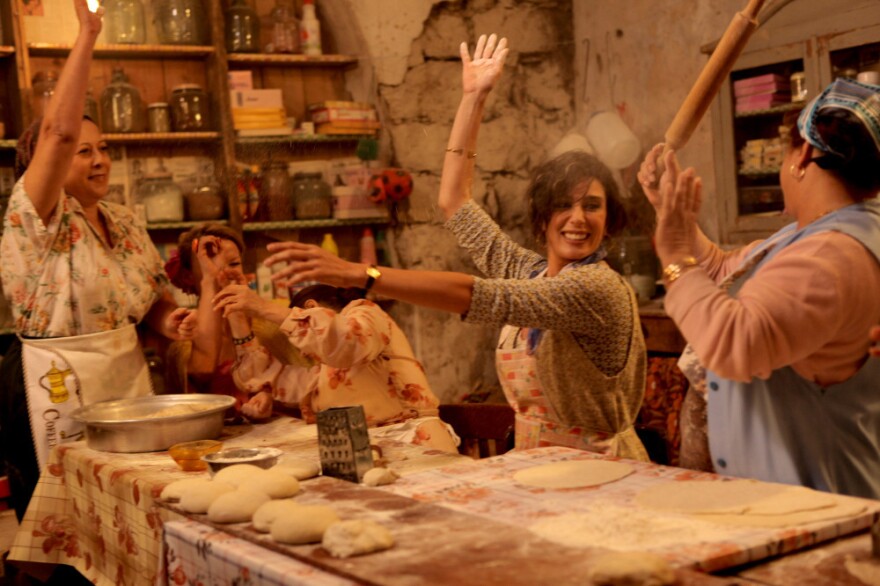Where Do We Go Now? is the brainchild of bloodshed. The film, which has been a megahit in the Middle East, is a bittersweet comedy about a group of women determined to stop their hotheaded men from starting a religious war. It's the second feature film from Lebanese director Nadine Labaki.
When violence erupted on the streets of Beirut in 2008, Labaki saw neighbors, friends, people who were practically brothers turn against each another. As the world around her spiraled out of control, Labaki discovered she was having a baby.
"I just learned that I was pregnant," she says. "And I think it does change your perspective on things, and you do think of this child that you're bringing into the world, and what kind of society is this?"

That was when her maternal instinct ran wild, she says. "I thought: What if now he was 20 years old and he was tempted to take a weapon? What would I do as a mother, and how far would I go to stop him?"
In Where Do We Go Now? Labaki imagines just how far she might go to stop a war. It's set in a remote Arab village where Muslims and Christians across the country are waging a modern-day crusade.
Some scenes are raw and emotional, but the film turns into a farce as Muslim and Christian women team up to try everything imaginable to distract their men from war — everything from faking a miracle to hiring Ukrainian strippers to baking pastries filled with hashish to burning all the newspapers in town so their husbands won't be able to read the latest war updates.
For Labaki, laughter is medicine with a message. "Laughter and humor is important to start the healing process," she says, "because it's really when you laugh about your flaws that you start understanding that maybe you should change something about it."
But Arab film critic Joseph Fahim says Labaki waters down the grim reality of war. "I think there was major dissonance between what she was trying to achieve and what appeared on screen," he says. "I think the subject matter being tackled in such a lighthearted way didn't feel convincing to me."
Even if I'm making fun of some of the things that I find ridiculous, I'm doing it with respect. ... I'm entitled to criticize, I'm entitled to say: Look at our flaws, look at how we are.
Mixing comedy and culture is tricky for this film, and another one opening next week. Sacha Baron Cohen's new movie, The Dictator, centers around Admiral General Aladeen, a tyrant who shoots his subjects on a whim. Some Arab-Americans say the comedy hits a raw nerve at a time when real dictators in the Middle East are slaughtering their citizens.
Labaki says her comedy is different. She mocks her own culture carefully. "Even if I'm making fun of some of the things that I find ridiculous, I'm doing it with respect," she says. "'Cause I'm there, and I'm entitled to criticize, I'm entitled to say: Look at our flaws, look at how we are. It's different when it's coming from someone not from there. It's perceived differently."
For Labaki, making movies in her native country is a labor of love. She says Lebanon doesn't have much of a film industry. "When I finished school, there was no opportunities ... I couldn't go and work on a film set," she says.
So she turned to music videos — which she made for Lebanon's top pop stars — and became a sensation overnight. Less than a decade later, Variety magazine named her one of the top 10 directors to watch for her first feature film, Caramel.The chick-flick is a sort of tame Arab version of Sex and the Citycentered around a Beirut beauty shop.
Fahim says Labaki's work is famous for challenging stereotypes of Arab women. "It feels like in many ways a celebration of the strength of the Arab woman," he says. "And the fact that these women are gluing together the fabric of this country — I found that very refreshing."
In the U.S, Labaki's films tend to play in small, art-house cinemas. But, in the Middle East, they're blockbuster sensations that show in multiplexes from Beirut to Cairo. So, if Americans want a little window into what's popular in the Arab world, watching Where Do We Go Now? is a good place to start.
Copyright 2020 NPR. To see more, visit https://www.npr.org. 9(MDAxNDQ2NDAxMDEyNzU2NzM2ODA3ZGI1ZA001))






